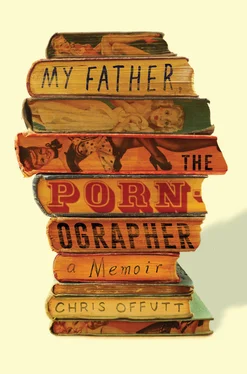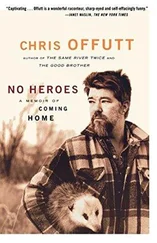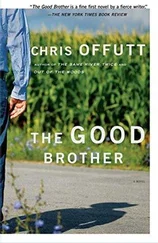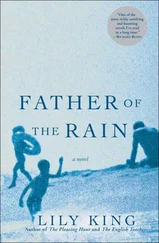Chris Offutt
My Father, the Pornographer: A Memoir
DEDICATED TO
Andrew Jefferson Offutt V
John Cleve
Turk Winter
Jeff Morehead
Jay Andrews
Opal Andrews
Drew Fowler
J. X. Williams
Jack Cory
Jeremy Crebb
John Denis
Alan Marshall
Jeff Woodson
Joe Brown
Jeff Douglas
Roscoe Hamlin
Camille Colben
Anonymous
As John Cleve, I will be famous in the next century. Bet on it.
— ANDREW J. OFFUTT, 1978
If not for writing pornography, I’d have been a serial killer.
— ANDREW J. OFFUTT, 1986
MY FATHER grew up in a log cabin near Taylorsville, Kentucky. The house had twelve-inch walls with gun ports to defend against attackers, first Indians, then soldiers during the Civil War. At age twelve, Dad wrote a novel of the Old West. He taught himself to type with the Columbus method — find it and land on it — using one finger on his left hand and two fingers on his right. Dad typed swiftly and with great passion. He eventually wrote and published more than four hundred books under eighteen different names. His novels included six science fiction, twenty-four fantasy, and one thriller. The rest was pornography.
When I was nine, Dad gave me his childhood copy of Treasure Island by Robert Louis Stevenson. The old hardback was tattered, the boards held by fraying strips of fabric, the pages pliant and soft. It is a coming-of-age narrative about thirteen-year-old Jim Hawkins, who discovers a secret map, leaves England, and returns with a large share of pirate treasure. I loved the fast-paced story and the bravery of young Jim.
On paper cut from a brown grocery sack, I carefully drew an island with a coastline, water, and palm trees. A dotted line led to a large red X. My mother suggested I show the map to my father. Dad wiped coffee on the paper and wadded it up several times, which made it seem older. He used matches to ignite the edges of the map, then quickly extinguished the flame. This produced a charred and ragged border that enhanced the map’s appearance, as if it had barely survived destruction. Because of the fire involved, we were alone outside, away from my younger siblings. Dad was selling insurance at the time, rarely home, his attention always focused elsewhere. I enjoyed the sense of closeness, a shared project.
Dad said that he drew maps for most of the books he wrote, and I resolved that if I ever published a book, I’d include a map. Twenty years later I did. In 1990 I called my father with the news that Vintage Contemporaries was publishing Kentucky Straight, my first book. A long silence ensued as Dad digested the information.
“I’m sorry,” he said.
“What do you mean?” I said.
“I didn’t know I’d given you a childhood terrible enough to make you a writer.”
His own father wrote short stories in the 1920s. During the Depression, my grandfather was forced to abandon his literary ambitions to save the family farm and pursue a more practical education in engineering. He died young, a year before my father published his first story. Dad never knew what it was like to have a proud father and didn’t know how to be one himself.
After the publication of Kentucky Straight, people began asking Dad what he thought of my success. Buried in the question was the implication that the son had outdone the father. My work was regarded as serious literature, whereas he wrote porn and science fiction. Twice I witnessed someone insinuate that Dad should be envious. Invariably my father had the same response. His favorite adventure novel was The Three Musketeers, in which young D’Artagnan wins respect through his magnificent swordplay, taught to him by his father. Every time someone asked Dad about my success as a writer, he said he was happy to be D’Artagnan’s sword master, voicing pride in my accomplishments but taking credit for them, as well. It was as close as he ever came to telling me how he felt about my work.
MY FATHER was a brilliant man, a true iconoclast, fiercely self-reliant, a dark genius, cruel, selfish, and eternally optimistic. Early in his sales career, a boss called him an “independent son of a bitch,” which Dad took as the highest compliment he’d ever received. He wanted me to be the same way.
Dad had no hobbies, no distractive activities. He didn’t do household chores, wash the car, mow the grass, go shopping, or fix anything. He never changed a lightbulb. I never saw him hold a screwdriver, stand on a ladder, or consult a repair manual. His idea of cleaning was to spit on a tissue and wipe the object. He didn’t sleep much. He drank. He rarely left the house. Dad was an old-school pulp writer, a machine who never stopped. In his home office hung a handmade sign that said: “Writing Factory: Beware of Flying Participles.”
The winter of 1968 was known in the hills as “the year of the big snows,” which closed my grade school for two weeks and trapped the family on our home hill in eastern Kentucky. For the first time in my father’s life, he could do what he always wanted — write fourteen hours a day. He ran out of cigarettes and Mom sent me to the general store a couple of miles away. I followed a path through the woods, each leafless tree limb lined with a layer of white. Frozen deer saliva glistened at the ends of chewed branches.
I made good time by walking the iced-over creek, sliding my feet along the bright surface. Smoke from the store’s wood stove rose to the top of the ridge, then flattened and began to dissipate in a long, low ribbon. Inside I sat by the fire until my wet pants legs were steaming and my feet had warmed. The proprietor, a kind man named George, gave me a piece of chocolate. He’d been in operation since the forties, the only business to survive the closing of the mines. He sold me cigarettes and I went home.
The following week I walked to the bootlegger for Dad. I left our dirt road for a game path through the woods, staying high enough on the hill to evade dogs. After a mile I dropped down the hill and crossed the blacktop to the bootlegger’s small shack. It was a one-room building with a sliding plywood panel serving as a window. No one ever robbed it, a testament to local respect and fear. I stood on layers of snow packed hard from tire tracks and the tread of many boots. The man inside was red-faced, with wild hair.
“Whose boy are you?” he said in a gruff voice.
“Andy Offutt’s first boy,” I said. “Chris.”
“Offutt,” he said. “Uh-huh. What’s he wanting?”
“Bourbon.”
“Bourbon,” he said. “Yep. Reckon you’re his boy, then.”
I placed ten dollars on the rough wood shelf. He exchanged the money for two pints of whiskey. I reached for them, but he grabbed my wrist with a grip stronger than I’d ever felt, as if the bones were rasping inside my arm. It was a test of sorts, and I tried not to show pain.
“Don’t you ever fuck with me,” he said.
I shook my head obediently. He released me and I entered the woods. Concealed from view, I dropped to my knees and rubbed snow on my wrist until both hands were numb. I could feel tears frozen below my eyes and was embarrassed, even alone in the ivory silence.
One summer a few years later, my two best friends and I decided we’d try drinking. We met at night in the woods and walked to the bootlegger. A different man was there, legendary for the length of his tongue, a.357 Magnum he occasionally flashed, and a certain rough charm with women. I told him I was Andy Offutt’s first boy and he’d sent me for whiskey. My buddies each bought what their fathers drank, and we left with bourbon, a half case of beer, and a large bottle of cheap red wine. Undoubtedly the bootlegger knew we were lying, but the hills were lawless in the 1960s.
Читать дальше












